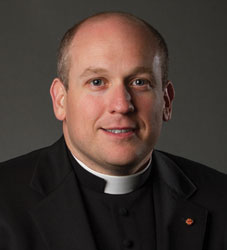 After the Passion Narratives in the four Gospels, this Sunday’s Gospel from John of the healing of the man born blind is both the longest and probably the most action-packed of all Gospel passages proclaimed at Mass. This passage is made up of rapid movement and interchanges between the Lord and His disciples, the Lord and the man born blind, the man once healed being interrogated by the Scribes and Pharisees, then the Scribes and Pharisees interrogate the man’s parents followed by a second interrogation of him, Jesus’s encounter with the man, and finally Jesus’s rebuke of the Scribes and Pharisees. What becomes clear in these interchanges is that there are two simultaneous journeys happening: one is moving towards the Light and one is moving away from the Light.
After the Passion Narratives in the four Gospels, this Sunday’s Gospel from John of the healing of the man born blind is both the longest and probably the most action-packed of all Gospel passages proclaimed at Mass. This passage is made up of rapid movement and interchanges between the Lord and His disciples, the Lord and the man born blind, the man once healed being interrogated by the Scribes and Pharisees, then the Scribes and Pharisees interrogate the man’s parents followed by a second interrogation of him, Jesus’s encounter with the man, and finally Jesus’s rebuke of the Scribes and Pharisees. What becomes clear in these interchanges is that there are two simultaneous journeys happening: one is moving towards the Light and one is moving away from the Light.
The man whom Jesus heals is said to have been blind from birth. The disciples assume, as was normative for the time, that his blindness was the result of sin, perhaps that of the man’s parents. The Lord tells them that his blindness is so that the glory of God might be revealed. This points to an interesting aspect of John’s Gospel. In Matthew, Mark, and Luke, Jesus’s miracles are always noted as the result of Jesus being moved with compassion for someone or for a group; in John, the miracles, or, rather, signs, that Jesus performs are not due to his compassion (which surely was not lacking), but to show the glory of God.
Another fascinating aspect of this passage is that Jesus is actually not a main actor. He is the one who animates the scene by healing the man but we see the man himself as the central evangelist. The man does not know who Jesus is but he knows that He must be of God because of what Jesus has done for him. In spite of the bullying and intimidation visited on him by the Scribes and the Pharisees, the man only becomes more persistent in wanting to know more about the man who healed him. Greater than the opening of the man’s eyes, is that his heart is opened to a new experience of faith. He professes his faith in Jesus and becomes the Lord’s disciple. He begins to walk by the light that is Jesus.
While the man born blind journeys closer and closer to the light that is the Lord Jesus, we see the Scribes and the Pharisees going in the opposite direction. They are comfortable and safe with a belief that God only works within specific parameters, only within the dictates of the law given by the Lord through Moses. They cannot accept that while God may choose to bind Himself to the law, He is never bound by the law. The law is given to lift people up to God, to help them on the journey to Him; but the Scribes and the Pharisees all too often saw the law as an end unto itself and thus made it an idol. The law is good, but God is also able to bring about good outside of the law or beyond it. Ultimately, the Scribes and the Pharisees see Jesus as a threat. They choose to blind themselves to the manifestation of the power of God in Jesus’s actions because to accept the truth of Jesus’s actions will mean that they have to change and they simply are not willing to do so.
Do we fall into the same traps at times? In our heart of hearts, do we at times know the truth that God is seeking to convey in our lives but we find it easier to “turn a blind eye” rather that acknowledging that maybe we are holding on to something that is contrary to God’s will or what God is asking of us? May the Lord heal us of any spiritual blindness and grant us the grace to not be afraid to see life by His light and to walk in his ways.
Father Christopher House is the Rector of the Cathedral and serves in various leadership roles within the diocesan curia, namely Chancellor and Vicar Judicial.